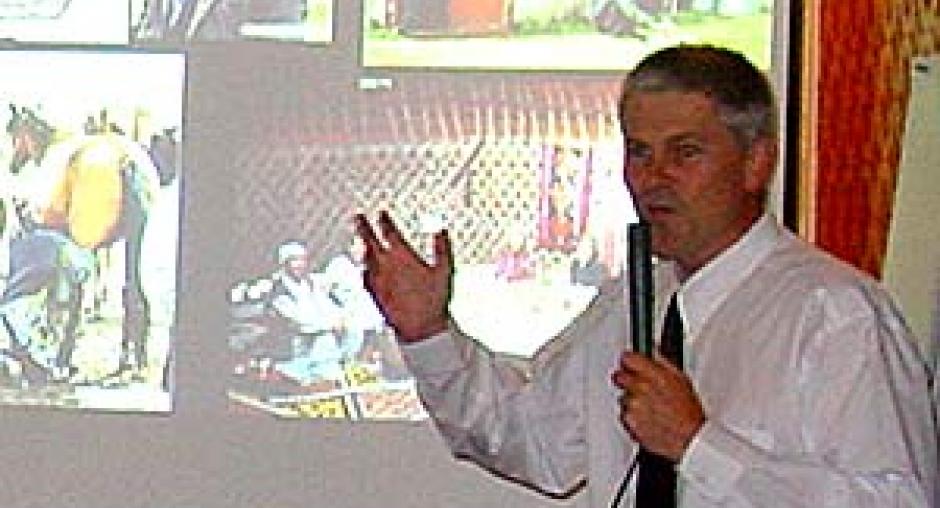Newsroom
OSCE workshop focuses on generating income from tourism in Central Asia
ALMATY 23 July 2004

(OSCE)Mark Elliott, travel author and tourism counsultant, speaking in Almaty at an OSCE/COEEA-arranged workshop on generating income from tourism in Central Asia, 22 July 2004. (OSCE) Photo details
ALMATY, 23 July 2004 - A two-day OSCE workshop that focused on generating income from Central Asia's tourism sector through the development of small and medium-sized enterprises has just ended today in Kazakhstan.
The event, which was organized by the Office of the OSCE Economic and Environmental Activities and the OSCE Centre in Almaty, had the support of the World Tourism Organization.
It drew representatives from governments, the private sector and civil society from the five Central Asian countries, together with international experts. They concluded with recommendations and proposals aimed at developing the rich potential of tourism in the region for further follow-up by governments and private sector.
Among these ideas were establishing Tourism Advisory Councils for each country, as well as for the Central Asian region, and organizing a Central Asian tourism fair.
Tugelbai Bekbergenov, the representative of Kazakhstan's Agency of Tourism and Sport, highlighted the OSCE's role as a link for establishing new market opportunities in the business area.
Marc Baltes, COEEA Deputy Co-ordinator, added: "I think we can agree that one of the most urgent needs for the countries of Central Asia is to attract private sector investment to provide job opportunities and economic stimulus for local communities".
Abror Rozikhodajaev, an expert from the national company, Uzbektourism, and representative of the Silk Road Initiative, stressed the importance of regional co-operation in Central Asia's tourism sector.
The event tried to identify challenges and new opportunities to enhance the prospects of generating increased sustainable tourism in the region. In three working groups, participants discussed issues such as the role of the state, marketing strategies and the development of small- and medium-sized enterprises in the region.
For example, the concept of hostelling, which caters to young travellers and promotes inter-cultural dialogue and environmental sustainability, was presented by the International Youth Hostel Federation. It generated much interest and may be considered as part of a new tourism strategy that could encourage greater understanding and openness of the region, as well as new economic opportunities for local communities.
The event, which was organized by the Office of the OSCE Economic and Environmental Activities and the OSCE Centre in Almaty, had the support of the World Tourism Organization.
It drew representatives from governments, the private sector and civil society from the five Central Asian countries, together with international experts. They concluded with recommendations and proposals aimed at developing the rich potential of tourism in the region for further follow-up by governments and private sector.
Among these ideas were establishing Tourism Advisory Councils for each country, as well as for the Central Asian region, and organizing a Central Asian tourism fair.
Tugelbai Bekbergenov, the representative of Kazakhstan's Agency of Tourism and Sport, highlighted the OSCE's role as a link for establishing new market opportunities in the business area.
Marc Baltes, COEEA Deputy Co-ordinator, added: "I think we can agree that one of the most urgent needs for the countries of Central Asia is to attract private sector investment to provide job opportunities and economic stimulus for local communities".
Abror Rozikhodajaev, an expert from the national company, Uzbektourism, and representative of the Silk Road Initiative, stressed the importance of regional co-operation in Central Asia's tourism sector.
The event tried to identify challenges and new opportunities to enhance the prospects of generating increased sustainable tourism in the region. In three working groups, participants discussed issues such as the role of the state, marketing strategies and the development of small- and medium-sized enterprises in the region.
For example, the concept of hostelling, which caters to young travellers and promotes inter-cultural dialogue and environmental sustainability, was presented by the International Youth Hostel Federation. It generated much interest and may be considered as part of a new tourism strategy that could encourage greater understanding and openness of the region, as well as new economic opportunities for local communities.
